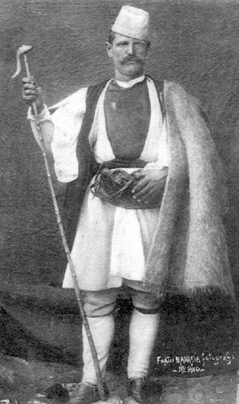Aromanians
Aromanians (Aromâni in Aromanian), also known as Vlachs, are a Romance-speaking ethnic group native to the Balkans. They are a branch of the Romanians, with whom they share common ancestry, language, and cultural traits. The Aromanians are traditionally nomadic shepherds and merchants, inhabiting mountainous areas in Greece, North Macedonia, Albania, Bulgaria, and Serbia. Their language, Aromanian, is closely related to Romanian, but has been significantly influenced by the Greek, Albanian, and Slavic languages due to centuries of cohabitation and interaction with these communities.
History[edit | edit source]
The origins of the Aromanians can be traced back to the Roman conquest of the Balkans, when Latin-speaking settlers and Roman soldiers intermingled with the local Illyrian and Thracian populations. Over the centuries, these Latin-speaking communities evolved into the Aromanians, developing distinct linguistic and cultural characteristics. During the Byzantine Empire, Aromanians played crucial roles as soldiers, administrators, and merchants. Their nomadic lifestyle, centered around transhumance, allowed them to establish widespread trading networks and maintain cultural cohesion despite the political changes in the region.
Language[edit | edit source]
Aromanian is a Romance language that shares many similarities with Romanian, reflecting their common Latin origin. However, Aromanian has also absorbed a significant number of words from Greek, Albanian, and Slavic, reflecting the diverse linguistic landscape of the Balkans. Despite its rich oral tradition, Aromanian lacks a standardized writing system, which has contributed to its classification as an endangered language.
Culture[edit | edit source]
Aromanian culture is a rich tapestry woven from their pastoral lifestyle, Orthodox Christian faith, and the influences of neighboring peoples. Traditional Aromanian music, dance, and attire are distinctive, with colorful costumes and intricate patterns. Aromanians are also known for their specific culinary traditions, which include a variety of cheeses and meat products suited to their nomadic lifestyle.
Current Situation[edit | edit source]
Today, the Aromanian community faces challenges such as assimilation, migration, and the loss of their language and cultural practices. Many Aromanians have migrated to urban areas within the Balkans or abroad, leading to a decline in traditional lifestyles. Efforts are being made to preserve Aromanian culture and language, including the establishment of cultural festivals, educational programs, and the use of media in the Aromanian language.
See Also[edit | edit source]
| This article is a stub. You can help WikiMD by registering to expand it. |
Search WikiMD
Ad.Tired of being Overweight? Try W8MD's physician weight loss program.
Semaglutide (Ozempic / Wegovy and Tirzepatide (Mounjaro / Zepbound) available.
Advertise on WikiMD
|
WikiMD's Wellness Encyclopedia |
| Let Food Be Thy Medicine Medicine Thy Food - Hippocrates |
Translate this page: - East Asian
中文,
日本,
한국어,
South Asian
हिन्दी,
தமிழ்,
తెలుగు,
Urdu,
ಕನ್ನಡ,
Southeast Asian
Indonesian,
Vietnamese,
Thai,
မြန်မာဘာသာ,
বাংলা
European
español,
Deutsch,
français,
Greek,
português do Brasil,
polski,
română,
русский,
Nederlands,
norsk,
svenska,
suomi,
Italian
Middle Eastern & African
عربى,
Turkish,
Persian,
Hebrew,
Afrikaans,
isiZulu,
Kiswahili,
Other
Bulgarian,
Hungarian,
Czech,
Swedish,
മലയാളം,
मराठी,
ਪੰਜਾਬੀ,
ગુજરાતી,
Portuguese,
Ukrainian
Medical Disclaimer: WikiMD is not a substitute for professional medical advice. The information on WikiMD is provided as an information resource only, may be incorrect, outdated or misleading, and is not to be used or relied on for any diagnostic or treatment purposes. Please consult your health care provider before making any healthcare decisions or for guidance about a specific medical condition. WikiMD expressly disclaims responsibility, and shall have no liability, for any damages, loss, injury, or liability whatsoever suffered as a result of your reliance on the information contained in this site. By visiting this site you agree to the foregoing terms and conditions, which may from time to time be changed or supplemented by WikiMD. If you do not agree to the foregoing terms and conditions, you should not enter or use this site. See full disclaimer.
Credits:Most images are courtesy of Wikimedia commons, and templates, categories Wikipedia, licensed under CC BY SA or similar.
Contributors: Kondreddy Naveen



